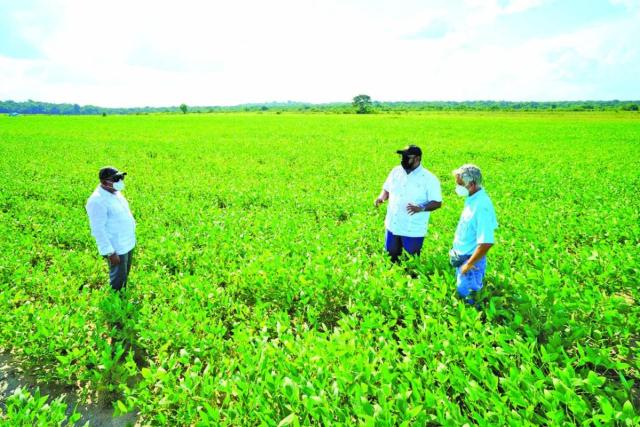Guyana’s corn and soya bean production has been on the rise, with the Government committing to the cultivation of these crops in the intermediate savannahs in order to become self-sufficient by 2025.
The commitment to expand the cultivation of these crops is in keeping with the Government’s manifesto promise.
Notably, the Administration plans to invest some $150 million in the construction of a wharf in the Tacama area to further support the industry this year.
The project will provide critical riverine access to the area under cultivation, making it more accessible for farmers to transport and export their produce.
The Government has played a crucial role in supporting the growth of the industry, with a commitment of over $1.2 billion to infrastructural development in the Tacama area.

In 2021, the Government started the trial of 125 acres of corn and soya bean, which showed major success.
Previously, Agriculture Minister Zulfikar Mustapha told the Department of Public Information (DPI), that the intention is to continuously increase production to cover at least 25,000 acres by 2025.
The Minister believes the aim of becoming self-sufficient by 2025 is ambitious, and with the continued support of the Government and the private sector, it is achievable.
The key stakeholders in the massive corn and soya bean cultivation include the Government, farmers, and private companies. Last year, the Government improved access to the area by constructing 40 kilometres of road, with the remaining seven kilometres scheduled to be completed in 2023.
Additionally, the Government invested in a drying and storage facility for corn and soya bean which will be completed by the first quarter of this year, establishing the first such facility in the country.

The Government’s investment in infrastructure and facilities is expected to significantly increase the yields and profits of farmers, and boost the country’s economy.
Minister Mustapha has already announced his Ministry’s plans to start cultivating corn and soya bean in Moco Moco Village, North Rupununi.
The Ministry is also assessing the capacities in other regions, with the aim of taking the project there in the future.
Meanwhile, the PPP/C Government has provided farmers with subsidies and training programmes to help increase their yields and improve their livelihoods.
In addition, the Administration has also been investing in infrastructure such as irrigation systems and storage facilities to help farmers improve their crop management, and ensure their produce reaches markets in a timely manner.
Discover more from Guyana Times
Subscribe to get the latest posts sent to your email.













